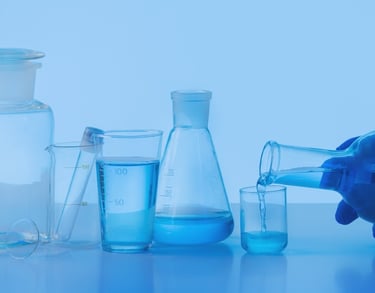Email us : scientific@sumisons.com. | call us : +91 7358100740 | +91 9940240809


Sumisons Scientific - Trusted Dealer & Distributor
Founded in 2018, Sumisons Scientific Pvt Ltd., has grown into leading Dealer & Distributor for multiple Brands in India
Laboratory glassware includes a variety of essential tools and containers made from glass, designed for use in scientific experiments, chemical analysis, and sample preparation. Known for its durability, chemical resistance, and ability to withstand high temperatures, glass is preferred in many laboratory applications. It is especially useful for precise measurements, heating, mixing, and observing reactions.
Key types of laboratory glassware include:
Beakers: -mouthed containers used for mixing, heating, and holding liquids. Beakers are typically marked with graduated measurements for approximate volume.
Flasks: Includes Erlenmeyer flasks (conical) for mixing and heating, and volumetric flasks for precise volume measurement of liquids.
Test Tubes: Small cylindrical tubes used for holding liquids or small amounts of substances during reactions or tests.
Pipettes : Precision instruments used for transferring small amounts of liquids, with types including graduated, volumetric, and micropipettes for various accuracy levels.
Burettes: Used for the precise delivery of liquid reagents in titrations, often with fine control over volume.
Graduated Cylinders: Tall, narrow containers used to measure liquid volumes accurately. Graduated cylinders come in various sizes and are marked with precise measurements.
Petri Dishes: Shallow, flat dishes used for culturing bacteria, fungi, or other microorganisms in microbiological studies.
Condensers: Used in distillation processes to cool and condense vapors back into liquids, typically part of a distillation apparatus.
Funnels: Used to transfer liquids or powders into containers with small openings, often paired with filter paper for filtration.
Laboratory glassware is usually made from borosilicate glass, which is heat-resistant and chemically inert, making it ideal for high-temperature and corrosive applications. It can be easily cleaned and sterilized, which is crucial for maintaining accuracy and preventing contamination in experiments.
While glassware offers superior precision and resistance to chemical reactions, it is also more fragile and prone to breakage compared to plasticware. As a result, careful handling is necessary. Glass laboratory tools are commonly used in chemistry, biology, pharmaceuticals, and medical research, where accuracy and high performance are critical.
About laboratory Glassware

